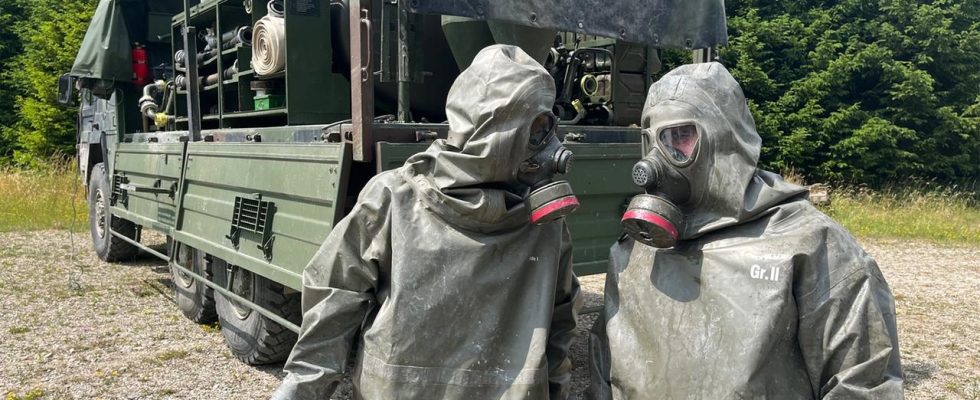In southern Bavaria, Ukrainian soldiers are training in case Russia uses radioactive, biological or chemical weapons. They have to complete the training, which otherwise takes months, in just three weeks.
On a military training area in southern Bavaria, the exact location cannot be named. The security measures are comprehensive: Photographs and film recordings must later be uploaded to a Ministry of Defense cloud and deleted under supervision. They are then checked in Berlin to see if anything can be traced back to the identity of the Ukrainian soldiers or their location. Only then will the release or deletion take place.
Interviews should be possible. Yevhen, Andrej and Sergej have agreed. The middle-aged, burly men – their exact age and places of origin are also secret – were still sweating an hour earlier at around 30 degrees in their NBC protective suits with gas masks. They are three of 30 Ukrainian soldiers who have been trained here in recent weeks. Trained in case Russia might use radioactive, biological or chemical weapons in Ukraine.
Your task is then to clean the contaminated military vehicles and make them operational again. Germany has so far delivered six of the six-wheeled special vehicles of the type HEP 70 to Ukraine, it is said – but there is no confirmation. No answer either to questions about how many courses this is and whether there are more to come. What takes months to train in the Bundeswehr, the Ukrainian soldiers have to learn and master in just three weeks.
Ukrainian soldiers train decontamination of military vehicles.
Fear of Russian ABC attack?
“We are dealing with highly motivated soldiers who don’t stop work after eight hours, but have practiced and learned every day until late in the evening,” says the commander, Lieutenant Colonel Daniel Razat, who observes the final exercises. Does he really believe that the short period of training is enough for an emergency? “I don’t believe it, I know it. We trained them and you can see the result here,” is his militarily concise and clear answer. He points to the ongoing exercise.
The midday sun burns mercilessly from the sky. In the protective suits with the breathing mask, it must be incredibly hot and breathing difficult. But the Ukrainian soldiers do their job quickly and routinely. At this station, in the event of a chemical attack, they would spray a white solution like poison gas, which would then neutralize warfare agents like VX.
A routine in 30 days where others need months.
Do you really think Russia could use nuclear bombs, poison gas or biological weapons? Yevhen insists on officially replying in Ukrainian. But the Bundeswehr interpreter can only speak Russian. So Yevhen, clearly reluctant, translates his answer into Russian and the interpreter back into German. “Taking into account that we are currently waging war against a terrorist state, one cannot rule out the use of tactical nuclear weapons or a terrorist attack on a nuclear power plant. Experience has shown that Russia does not shy away from destroying the hydroelectric power plant or causing a natural disaster or genocide against the Ukrainian people,” was his reply. But now he and his comrades are at least able to react.
Private questions aren’t allowed, but he only answers with “yes” whether he has contacts in Ukraine. Finally, he reiterates that the training was successful and adds with a slight hesitation: “But I hope we never have to use our skills.”

